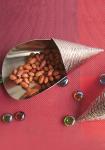Cheer up, the coming Union Budget might just make your imported tipple more affordable - on a par with local booze.
The Centre is planning to bring the countervailing duty on imported foreign alcoholic beverages in line with state excise duties through the Countervailing Duty on Imported Alcoholic Liquors Bill 2007. The Bill is expected to be tabled in the forthcoming Budget session of Parliament.
Sources said a draft Cabinet note has been approved by Finance Minister P Chidambaram, seeks to levy CVD at the same rate as state excise duties on domestically manufactured liquor.
At present, excise duties vary across states. Andhra Pradesh levies excise of Rs 1,200-1,500 per case of IMFL whisky. In Delhi, it stands at Rs 1,500, and Rs 1,400 in Rajasthan.
CVD on foreign spirits ranges from 25 per cent to 150 per cent, while for imported wines, it stands at 20 per cent to 75 per cent. The CVD was introduced in 2001 to ensure a level playing field between domestic and foreign liquor companies, as states cannot levy duties on foreign-made liquor.
The move has a number of implications. For consumers, it will mean their favourite tipple will be cheaper. For the central exchequer, it means foregoing revenue of around Rs 25 crore (Rs 250 million) per year.
It could also lead to a distortion in imports of foreign liquor - with importers favouring states that have lower excise duty. This is because the incidence of the countervailing duty shall fall on consumption - that is it will be collected by the state in which the imported liquor is consumed.
This also means CVD rates will vary from state to state, unless the states agree to a recent central proposal to cap the excise rates and usher in a uniform policy across the country.
At present, the Centre is levying CVD at average of the state excise duties.
As a result, the CVD is much higher than that of the actual excise levy prevailing in a large number of states.
The European Commission had argued that this structure was not WTO-compliant and had warned that it would press for the formation of a dispute settlement Panel to settle the issue.
As per the proposed bill, the CVD will be levied by the Centre, but will be collected by the state concerned, in the same manner as Central Sales Tax. The relevant provisions of the State Excise Acts and rules will be applied to the administration of the CVD on imported liquor as well.







 © 2025
© 2025